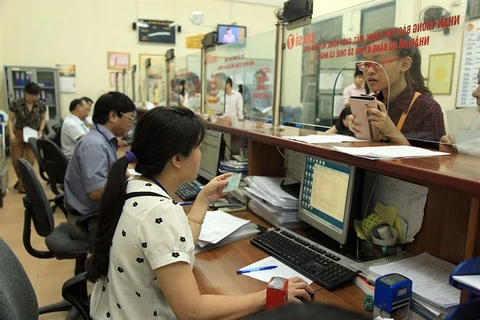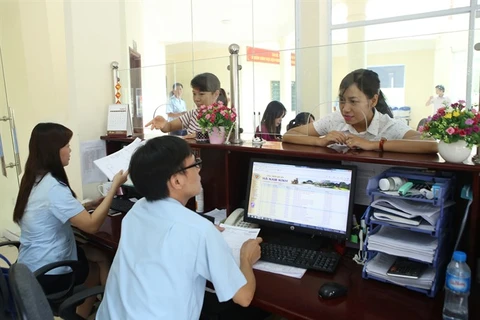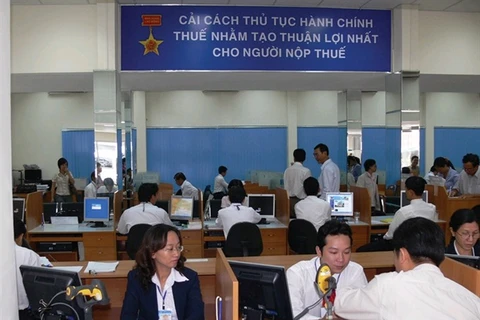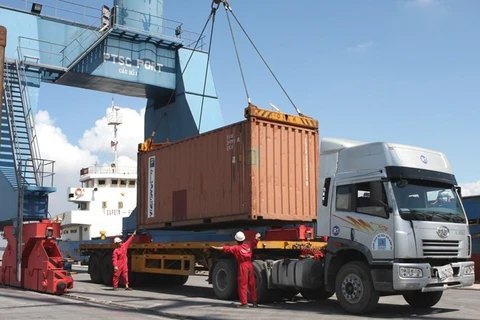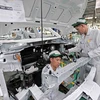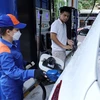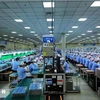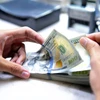Hanoi (VNA) - The Ministry of Finance has proposed, in a draft law, almost tripling the environmental protection tax on oil and gas consumption from the current 3,000 VND (0.13 USD) to 8,000 VND per litre.
The draft will be submitted to the Government for approval in June and the National Assembly in October.
The new draft law also added E5 bio-fuel and E10 ethanol blend fuel to include in the environmental protection taxes of 2,700-7,200 VND and 2,500-6.800 VND per litre, respectively, though the products are considered cleaner and environmentally friendly than others.
In addition, the tax on aviation fuel was suggested to be increased from the current 1,000-3,000 VND to 3,000-6,000 VND per litre.
The tax on diesel fuel is expected to increase from the current 500-2,000 VND to 1,500-4,000 VND per litre, while that of mazut will also go up to 900-4,000 VND from 300-2,000 VND per kilo.
Plastic bags are also expected to see higher environmental taxes, rising from 30,000-50,000 VND to 40,000-80,000 VND per kilo, if the draft is approved.
Earlier, Minister of Finance Do Hoang Anh Tuan acknowledged that the sector would continue promoting the collection of environmental protection taxes. This year, the ministry would expand categories to be taxed.
Tuan said if the current environmental protection tax on petroleum was increased over the ceiling level, the value of collections would be 10 to 20 times higher than the direct collection from non-agricultural land use.
The ministry said the increased tax on some natural resources, and environmental protection on petroleum, had contributed to the domestic collection, thus easing difficulties for the State budget.
Experts believed that the proposed increase in the environmental protection tax would also raise gasoline costs in the country.
Vo Tri Thanh, deputy head of the Central Institute for Economic Management, said the Government should review the application of both special consumption taxes and environmental protection taxes, since the special consumption tax includes environmental fees.
Meanwhile, economist Nguyen Minh Phong said a hike in the environmental protection tax had been a method for increasing the State budget through petroleum prices. However, whether the tax was spent on environmental protection should be clarified, as there has been no specific report on the issue.
“The necessary issue is how to use the collection effectively, transparently and following the current laws,” Phong added.
In 2014, a similar hike was imposed, raising taxes from 1,000 VND to 3,000 VND, which the ministry referred to as a good way to stabilise the national budget.
According to the current law on environmental protection taxes issued in 2012, products such as oil, gas, grease, coal, and plastic bags are subject to these types of tariffs.
Statistics from the ministry also indicated that the environmental protection tax contributed from 1.5 to 4.1 percent of the annual revenue of the national budget.-VNA
The new draft law also added E5 bio-fuel and E10 ethanol blend fuel to include in the environmental protection taxes of 2,700-7,200 VND and 2,500-6.800 VND per litre, respectively, though the products are considered cleaner and environmentally friendly than others.
In addition, the tax on aviation fuel was suggested to be increased from the current 1,000-3,000 VND to 3,000-6,000 VND per litre.
The tax on diesel fuel is expected to increase from the current 500-2,000 VND to 1,500-4,000 VND per litre, while that of mazut will also go up to 900-4,000 VND from 300-2,000 VND per kilo.
Plastic bags are also expected to see higher environmental taxes, rising from 30,000-50,000 VND to 40,000-80,000 VND per kilo, if the draft is approved.
Earlier, Minister of Finance Do Hoang Anh Tuan acknowledged that the sector would continue promoting the collection of environmental protection taxes. This year, the ministry would expand categories to be taxed.
Tuan said if the current environmental protection tax on petroleum was increased over the ceiling level, the value of collections would be 10 to 20 times higher than the direct collection from non-agricultural land use.
The ministry said the increased tax on some natural resources, and environmental protection on petroleum, had contributed to the domestic collection, thus easing difficulties for the State budget.
Experts believed that the proposed increase in the environmental protection tax would also raise gasoline costs in the country.
Vo Tri Thanh, deputy head of the Central Institute for Economic Management, said the Government should review the application of both special consumption taxes and environmental protection taxes, since the special consumption tax includes environmental fees.
Meanwhile, economist Nguyen Minh Phong said a hike in the environmental protection tax had been a method for increasing the State budget through petroleum prices. However, whether the tax was spent on environmental protection should be clarified, as there has been no specific report on the issue.
“The necessary issue is how to use the collection effectively, transparently and following the current laws,” Phong added.
In 2014, a similar hike was imposed, raising taxes from 1,000 VND to 3,000 VND, which the ministry referred to as a good way to stabilise the national budget.
According to the current law on environmental protection taxes issued in 2012, products such as oil, gas, grease, coal, and plastic bags are subject to these types of tariffs.
Statistics from the ministry also indicated that the environmental protection tax contributed from 1.5 to 4.1 percent of the annual revenue of the national budget.-VNA
VNA

